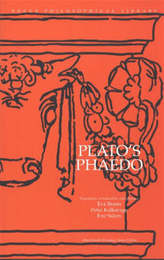
|
Phaedo
Paperback / softback
Main Details
| Title |
Phaedo
|
| Authors and Contributors |
By (author) Plato
|
|
Edited by Eva Brann
|
|
Edited by Peter Kalkavage
|
|
Edited by Eric Salem
|
| Series | Focus Philosophical Library |
|---|
| Physical Properties |
| Format:Paperback / softback | | Pages:118 | | Dimensions(mm): Height 216,Width 140 |
|
| Category/Genre | Literary essays
Western philosophy - Ancient to c 500 |
|---|
| ISBN/Barcode |
9780941051699
|
| Classifications | Dewey:184 |
|---|
| Audience | | Undergraduate | | Postgraduate, Research & Scholarly | | Professional & Vocational | | General | |
|---|
| Illustrations |
none
|
|
Publishing Details |
| Publisher |
Focus Publishing/R Pullins & Co
|
| Imprint |
Focus Publishing/R Pullins & Co
|
| Publication Date |
1 September 1998 |
| Publication Country |
United States
|
Description
This is an English translation of one of Plato's great dialogues of Socrates talking about death, dying, and the soul due to his impending execution. Included is an introduction and glossary of key terms. Focus Philosophical Library translations are close to and are non-interpretative of the original text, with the notes and a glossary intending to provide the reader with some sense of the terms and the concepts as they were understood by Plato's immediate audience.
Author Biography
Eva Brann is a tutor and member of the senior faculty at St. John's College, Annapolis, where she has also been dean of academic affairs. She holds an M.A. in Classics and a Ph.D. in Archaeology from Yale University. Her recent books include "The Ways of Naysaying; What, Then, Is Time?" and "The World of the Imagination." She has co-authored several translations with Focus Publishing. Peter Kalkavage is a Tutor at St. John's College, Annapolis. Eric Salem is a Tutor at St. Johns College, Annapolis.
ReviewsThis marvelously conceived new translation of Plato's most important dialogue will set the standard for classroom use for many years to come... The authors' imaginative new interpretation will inspire students and generate scholarly controversy - and is thus certain to accomplish what it suggests is the true aim of Socratic inquiry: the weaving, unweaving, and perpetual re-weaving of the Logos. - Dr. George R. Lucas, Jr., Professor of Philosophy, US Naval Academy, Annapolis
|